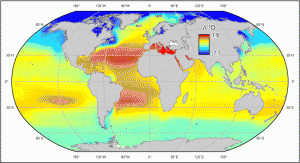Stable isotopes have become an indispensable tool for understanding natural and anthropogenically-influenced systems. Large databases of spatially explicit isotopic data and new data analysis tools are now presenting new opportunities to exploit spatiotemporal isotopic variability (isoscapes) as a source of information on the connectivity, variability, and sensitivity to change of climatalogical, hydrological, and biogeochemical processes. The SPATIAL (Spatio-temporal Isotope Analytics Lab) Short Course builds on the skills and knowledge base developed in IsoCamp (ITCS Course 1) or equivalent stable isotope biogeochemistry coursework to introduce current research themes in large-scale ecology and environmental Earth science, theoretical and technical aspects of assembling and working with large, spatially distributed datasets, and analytical and computational tools available to support such work. This course focuses on stable isotopes in a geospatial framework to address:
Earth surface systems – Environmental, biological, and anthropogenic controls on ecological and biogeochemical structure
Fluid systems – Source, transport, and reactive process controls on the distribution of isotopic and other biogeochemical tracers
Animal systems (including humans) – Inference of behavior, physiology and movement from spatial data; animal influences on biogeochemical systems
For more information regarding the SPATIAL summer short course, please visit: https://itce.utah.edu/spatial.html
For more information regarding the IsoCamp summer short course, please visit: http://stableisotopes.utah.edu/index.html
